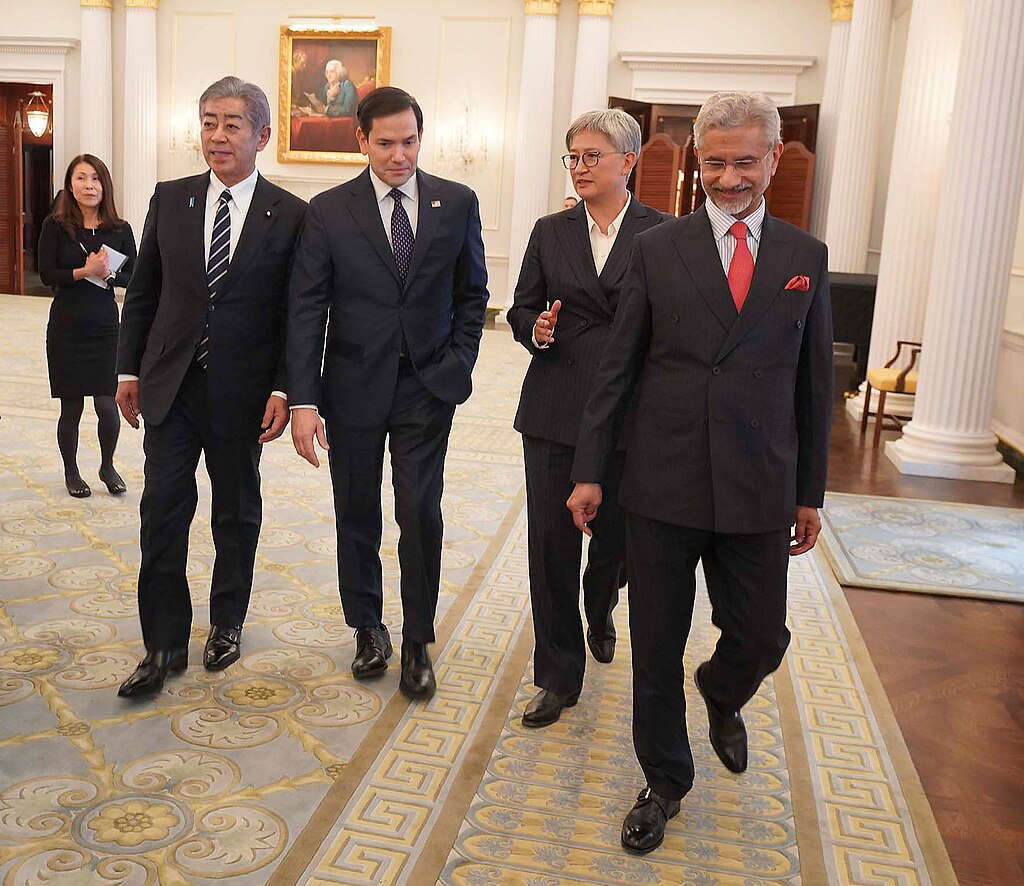The United States, Australia, India, and Japan have reaffirmed their commitment to a Free and Open Indo-Pacific after a high-level Quad meeting in Washington. Hosted by U.S. Secretary of State Marco Rubio, the talks marked the first major diplomatic event since President Donald Trump began his second term.
The Quad's joint statement emphasized upholding democratic values, sovereignty, and territorial integrity. The group strongly opposed unilateral actions altering the status quo, a clear reference to China’s assertive claims over Taiwan and disputes in the South and East China Seas. Japan also voiced concerns about North Korea’s nuclear ambitions and sought U.S. support on abduction issues with Pyongyang.
Australia's Foreign Minister Penny Wong highlighted positive discussions on the AUKUS defense pact, including nuclear-powered submarines and supply chain security. Meanwhile, Japan’s Takeshi Iwaya advocated for stronger defense ties and investment-friendly policies amid Japan’s significant military expansion.
China dismissed the Quad as a Cold War relic and criticized AUKUS for escalating regional tensions. Despite this, the Quad remains focused on countering Beijing’s influence, particularly in the Indo-Pacific.
Bilateral meetings reinforced alliances, with Rubio engaging separately with Wong, Iwaya, and India’s Subrahmanyam Jaishankar. Australia sought U.S. reassurances on defense cooperation, while Japan pushed for a Trump-Ishiba meeting to address investment concerns following U.S. restrictions on Japanese acquisitions.
The Quad nations aim to strengthen cybersecurity, secure critical infrastructure, and safeguard undersea cables, underscoring their shared commitment to regional stability and global security. This renewed alignment signals a robust approach to addressing challenges in East Asia.
Keywords: Quad meeting, Indo-Pacific security, Marco Rubio, AUKUS, China, Taiwan, U.S.-Japan relations, Penny Wong, Subrahmanyam Jaishankar, Takeshi Iwaya.



 U.S. Sanctions on Russia Could Expand as Ukraine Peace Talks Continue, Says Treasury Secretary Bessent
U.S. Sanctions on Russia Could Expand as Ukraine Peace Talks Continue, Says Treasury Secretary Bessent  Trump Signs Executive Order Threatening 25% Tariffs on Countries Trading With Iran
Trump Signs Executive Order Threatening 25% Tariffs on Countries Trading With Iran  Trump Lifts 25% Tariff on Indian Goods in Strategic U.S.–India Trade and Energy Deal
Trump Lifts 25% Tariff on Indian Goods in Strategic U.S.–India Trade and Energy Deal  Marco Rubio Steps Down as Acting U.S. Archivist Amid Federal Law Limits
Marco Rubio Steps Down as Acting U.S. Archivist Amid Federal Law Limits  UAE Plans Temporary Housing Complex for Displaced Palestinians in Southern Gaza
UAE Plans Temporary Housing Complex for Displaced Palestinians in Southern Gaza  Trump Says “Very Good Talks” Underway on Russia-Ukraine War as Peace Efforts Continue
Trump Says “Very Good Talks” Underway on Russia-Ukraine War as Peace Efforts Continue  U.S. Announces Additional $6 Million in Humanitarian Aid to Cuba Amid Oil Sanctions and Fuel Shortages
U.S. Announces Additional $6 Million in Humanitarian Aid to Cuba Amid Oil Sanctions and Fuel Shortages  U.S. to Begin Paying UN Dues as Financial Crisis Spurs Push for Reforms
U.S. to Begin Paying UN Dues as Financial Crisis Spurs Push for Reforms  Trump Endorses Japan’s Sanae Takaichi Ahead of Crucial Election Amid Market and China Tensions
Trump Endorses Japan’s Sanae Takaichi Ahead of Crucial Election Amid Market and China Tensions  Ohio Man Indicted for Alleged Threat Against Vice President JD Vance, Faces Additional Federal Charges
Ohio Man Indicted for Alleged Threat Against Vice President JD Vance, Faces Additional Federal Charges  Nighttime Shelling Causes Serious Damage in Russia’s Belgorod Region Near Ukraine Border
Nighttime Shelling Causes Serious Damage in Russia’s Belgorod Region Near Ukraine Border  Trump Rejects Putin’s New START Extension Offer, Raising Fears of a New Nuclear Arms Race
Trump Rejects Putin’s New START Extension Offer, Raising Fears of a New Nuclear Arms Race  NATO to Discuss Strengthening Greenland Security Amid Arctic Tensions
NATO to Discuss Strengthening Greenland Security Amid Arctic Tensions  China Warns US Arms Sales to Taiwan Could Disrupt Trump’s Planned Visit
China Warns US Arms Sales to Taiwan Could Disrupt Trump’s Planned Visit  New York Legalizes Medical Aid in Dying for Terminally Ill Patients
New York Legalizes Medical Aid in Dying for Terminally Ill Patients  Trump Signs “America First Arms Transfer Strategy” to Prioritize U.S. Weapons Sales
Trump Signs “America First Arms Transfer Strategy” to Prioritize U.S. Weapons Sales  Norway Opens Corruption Probe Into Former PM and Nobel Committee Chair Thorbjoern Jagland Over Epstein Links
Norway Opens Corruption Probe Into Former PM and Nobel Committee Chair Thorbjoern Jagland Over Epstein Links 































